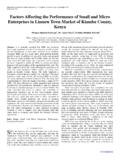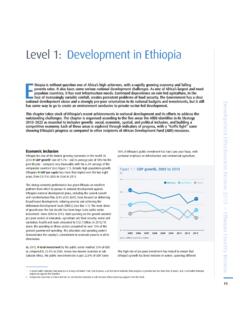Transcription of DEFINITIONS FOR SMALL AND MEDIUM ENTERPRISES IN …
1 DEFINITIONS FOR SMALL AND MEDIUM ENTERPRISES IN MALAYSIA (Approved for Adoption by National SME Development Council on 9 June 2005) Issued by: Secretariat to National SME Development Council Bank Negara Malaysia 13 September 2005 CONTENTS Page 1. Rationale for Standard DEFINITIONS for SMALL and MEDIUM ENTERPRISES 2 2. Coverage of DEFINITIONS for SMEs in Malaysia 2 3.
2 Approved SME DEFINITIONS 3 4. Application of Approved SME DEFINITIONS 6 5. Usage of Common Identifier 7 6. Secretariat to National SME Development Council 7 Appendix 1: National SME Development Council Appendix 2: Classification of Economic Activities Across Sectors Based on MSIC 2000 DEFINITIONS for SMALL and MEDIUM ENTERPRISES in Malaysia 21. RATIONALE FOR STANDARD DEFINITIONS FOR SMALL AND MEDIUM ENTERPRISES Presently, there is no common definition of SMALL and MEDIUM ENTERPRISES (SMEs) in Malaysia.
3 Different Agencies define SMEs based on their own criteria, usually benchmarking against annual sales turnover, number of full-time employees or shareholders funds. In addition, present DEFINITIONS focus mainly on SMEs in the manufacturing sector. The establishment and adoption of standard DEFINITIONS for SMEs will facilitate better identification of SMEs across sectors, thus enabling more effective formulation of SME policies and implementation of SME development programmes, and provision of technical and financial assistance. It will also allow better monitoring of SME performance and their contribution to the economy.
4 The National SME Development Council has, on 9 June 2005, approved the common DEFINITIONS of SMEs across economic sectors, for adoption by all Government Ministries and Agencies involved in SME development, as well as financial institutions. Details on the Council are provided in Appendix 1. 2. COVERAGE OF DEFINITIONS FOR SMEs IN MALAYSIA For wider coverage and applicability, DEFINITIONS of SMEs will be based on two criteria, namely: Number of employees; or Annual sales turnover. Therefore, an enterprise will be classified as an SME if it meets either the specified number of employees or annual sales turnover definition.
5 DEFINITIONS for SMALL and MEDIUM ENTERPRISES in Malaysia The DEFINITIONS will apply for the following sectors: Primary agriculture ; Manufacturing (including agro-based); Manufacturing-Related Services (MRS); and Services (including Information and Communications Technology). For consistency and comparability of data across sectors, the working definition for SMEs in the mining and quarrying sector, and construction sector will be based on the SME definition for the services sector (as per paragraph below). To ensure comparability of data from the various sources and to facilitate data harmonisation across the various providers of SME statistics, classification of economic activities will be based on the Malaysian Standard Industrial Classification (MSIC) 2000 codes.
6 Appendix 2 provides the list of economic activities under the various sectors. The following list of approved SME DEFINITIONS is not exhaustive and may be amended or expanded by the National SME Development Council from time to time to reflect changes in operating and business conditions. 3. APPROVED SME DEFINITIONS Primary agriculture General Definition A SMALL and MEDIUM enterprise in primary agriculture is an enterprise with full-time employees not exceeding 50 or annual sales turnover not exceeding RM5 million. DEFINITIONS for SMALL and MEDIUM ENTERPRISES in Malaysia 4 Specific DEFINITIONS A micro enterprise in primary agriculture is an enterprise with full-time employees of less than 5 or with annual sales turnover of less than RM200,000; A SMALL enterprise in primary agriculture is an enterprise with full-time employees of between 5 and 19 or with annual sales turnover of between RM200,000 and less than RM1million.
7 And A MEDIUM enterprise in primary agriculture is an enterprise with full-time employees of between 20 and 50 or with annual sales turnover of between RM 1 million and RM5 million. Manufacturing (including agro-based) and MRS General Definition A SMALL and MEDIUM enterprise in manufacturing (including agro-based) and MRS is an enterprise with full-time employees not exceeding 150 or with annual sales turnover not exceeding RM25 million. Specific DEFINITIONS A micro enterprise in manufacturing (including agro-based) and MRS is an enterprise with full-time employees of less than 5 or with annual sales turnover of less than RM250,000; A SMALL enterprise in manufacturing (including agro-based) and MRS is an enterprise with full-time employees of between 5 and 50 or with annual sales turnover of between RM250,000 and less than RM10 million.
8 And DEFINITIONS for SMALL and MEDIUM ENTERPRISES in Malaysia A MEDIUM enterprise in manufacturing (including agro-based) and MRS is an enterprise with full-time employees of between 51 and 150 or with annual sales turnover of between RM10 million and RM25 million. Services (including ICT) General Definition A SMALL and MEDIUM enterprise in services is an enterprise with full-time employees not exceeding 50 or annual sales turnover not exceeding RM5 million. Specific DEFINITIONS A micro enterprise in services is an enterprise with full-time employees of less than 5 or with annual sales turnover of less than RM200,000; A SMALL enterprise in services is an enterprise with full-time employees of between 5 and 19 or with annual sales turnover of between RM200,000 and less than RM1million; and A MEDIUM enterprise in services is an enterprise with full-time employees of between 20 and 50 or with annual sales turnover of between RM1 million and RM5 million.
9 The table below summarises the approved SME DEFINITIONS based on number of full-time employees: Sector Size Primary agriculture Manufacturing (including Agro-Based) & MRS Services Sector (including ICT) Micro Less than 5 employees Less than 5 employees Less than 5 employees SMALL Between 5 & 19 employees Between 5 & 50 employees Between 5 & 19 employees MEDIUM Between 20 & 50 employees Between 51 & 150 employees Between 20 & 50 employees DEFINITIONS for SMALL and MEDIUM ENTERPRISES in Malaysia The table below summarises the approved SME DEFINITIONS based on annual sales turnover: Sector Size Primary agriculture Manufacturing (including Agro-Based) & MRS Services Sector (including ICT) Micro Less than RM200,000 Less than RM250,000 Less than RM200,000 SMALL Between RM200,000 & less than RM1 million Between RM250,000 & less than RM10 million Between RM200,000 & less than RM1 million MEDIUM Between RM1 million & RM5 million Between RM10 million & RM25 million Between RM1 million & RM5 million 4.
10 APPLICATION OF APPROVED SME DEFINITIONS The approved DEFINITIONS are to be adopted by all the relevant stakeholders dealing with SMEs. These include Ministries and Agencies at Federal and State levels (including Statutory Bodies and local authorities), as well as financial institutions. The scope of application should, among others, encompass data collection; formulation of SME policies and programmes; and identification of eligibility status for SME financial assistance and support programmes. However, additional eligibility requirements can be applied based on specific development objectives of respective stakeholders.







